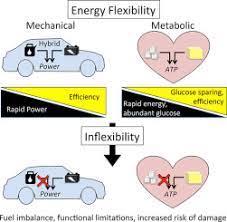The term looks complicated, but this is what is regulating your brain health, body shape and so much more.
If you want to age well with an abundance of energy, it’s important that you try to achieve what´s called metabolic flexibility.
Metabolic flexibility is the capacity to switch between using fat and glucose to generate energy in the form known as ATP.
The liver, adipose (fat) tissue, and muscle control your body´s metabolic flexibility and manage which of the nutrients: fats or glucose are used or stored. This is all regulated by hormonal cues and key “metabolic enzymes” that communicated with the mitochondria in your cells.
Mitochondria are our power factory’s. The human body has 1,00,000 to 6,00,000 mitochondria in each cell which can produce 90% of the energy in the body to perform daily tasks. They are also necessary in regulating our metabolic flexibility, how we create fuel and burn food we are eaten.
When we consume glucose supply (e.g. after eating/drinking any form of carbohydrate), glucose is used as the preferred fuel source and fat is stored. On the other hand, the absence of glucose released by the liver (e.g. overnight fast) or eaten, fat stores are used from body cells as fuel. As a result, a higher fatty acid supply to tissues replaces glucose as an energy source. The coordinated ability to switch among energy fuels according to fuel availability is the core concept defining metabolic flexibility.
With hormone fluctuations there are alterations to the metabolic flexibility of the mitochondria which is regulated by oestrogen that control many of the enzymes within the FUEL SWITCHING PATHWAYS in the mitochondria.
In our 20’s and 30’s the cells of the brain and cells of the energy system which drive metabolism are bathed in the natural monthly dance of oestrogen and progesterone. Oestrogen is the DIVA and rises in the first half of the cycle (approx. days 1-14) and progesterone (supporting actress) takes the stage mid-cycle, whilst oestrogen goes backstage. This is the gentle waltz that occurs between the two hormones every month. Metabolism relies heavily upon this dance to maintain a ”STATUS QUO”.
As we enter perimenopause and oestrogen levels become erratic soaring high and low, and pushing progesterone off stage, we suddenly see an erratic tango rather than a gentle waltz of the hormones. The reduction in oestrogen status and availability also causes a reduction of the antioxidant and anti-inflammatory genes in these powerhouses.
The two components combined act like a metabolic BRAKE slowing down the ability to BURN FAT (ketones) as fuel = increase weight, and the inability to use KETONES (instead of GLUCOSE) to fire brain neurons = more brain fog and forgetfulness.
This results in a decline in insulin sensitivity of the body´s cells and a shift towards insulin resistance, increased weight and elevations in LDL cholesterol, triglycerides and inflammatory chemicals.
Having the ability optimally to burn both sugar and fat to keep your mitochondria fuelled is the definition of metabolic flexibility.
It is often a declining metabolic flexibility midlife that contributes to brain fog, weight gain and other typical symptoms experienced. So when I hear: “I am eating and drinking what I´ve always done, but I am still putting on weight”, well this is when addressing diet and lifestyle has to happen and changes put into place. There are times in our life when we may not be able to eat and drink what we want, when we want without experiencing these changes.
There are many contributing factors to being METABOLICALLY INFLEXIBLE which includes genetic implications and nutritional deficiencies.
- Insulin insensitivity – Aim for low sugar/fasting when possible. Slowly increasing and staring with 12 hours for a week.
- High fat, high sugar diet – Switch to low sugar and moderate protein, clean fats and veggies
- Circadian disruption – Work on improving/maintaining a regular sleep pattern
- Oxidative stress – Eat a colourful rainbow diet with focus upon the cruciferous and leafy greens
- Inflammation – Ensure low sugar, plenty of healthy omega 3 fatty acids, eat a rainbow diet.
- Sedentary lifestyle – Move daily: a mix of cardio and weights
- Gut dysbiosis and Intestinal permeability – address any imbalance, reduce stress, food culprits
The key to long health is not a FAST metabolism, but a FLEXIBLE one.

